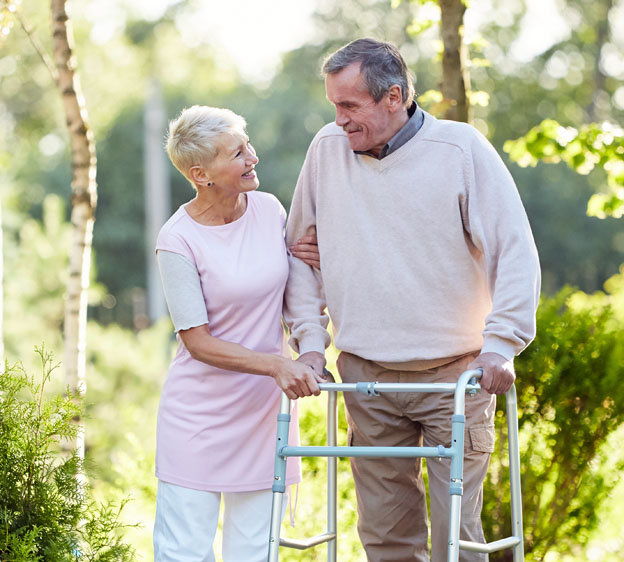
As stroke survivors travel through those critical rebuilding days, the support and knowledge of a family member or caregiver are vital to recovery. You may initially be in shock or denial that it happened to your loved one. And, you may be thinking, “How can I help? I know nothing about this!"
"The things I've seen really make a difference with stroke recovery are the support of family and friends, how motivated a patient is and the patient’s understanding of their deficits," says John Beverung, MA, CCC-LSLP, a speech-language pathologist in the Beaufort Memorial Acute Rehabilitation Unit.
How You Can Help a Stroke Survivor
Here are five ways to be inspirational and helpful to someone who has suffered a stroke.
1. Appoint one family member or friend as spokesperson.
With one person serving as the point of contact, there will be less confusion and disruption in your loved one's plan of care. And, that individual can be the one to relay information both directions (professional to family and family to professional). Having all of your loved one's physicians, nurses and therapists explain things to one person will give a more complete picture of what is happening and how decisions in one area may affect another.
If taking on that role sounds unmanageable, know that the spokesperson does not need to be the same person throughout the treatment and recovery period.
2. Educate yourself.
Don’t expect that you will know what your family member or friend is going through. Learning about what a stroke does and the recovery process will help you better understand and empathize with their situation.
"I often hear family members and friends ask 'why can't they do this?,'" says Beverung, who has more than 25 years of experience working in stroke rehabilitation. "Unfortunately, the person you knew yesterday or last week is not the same one here today."
One reputable source of information is the American Stroke Association, however a good place to start is with the healthcare professionals around you who are most familiar with your loved one's situation. Ask questions and let the staff know if you need further explanation. Your understanding and knowledge will be important for a smooth transition home and to support ongoing recovery.
Information that is specific to caregivers can also be helpful. The Caregiver Action Network offers information to help navigate caregiving challenges and a guide specific to caring for a stroke survivor.
Read More: Timing is Everything for Stroke Victims
3. Be a source of encouragement.
Offering support and encouragement will make a difference in your loved one's recovery. Celebrate each accomplishment, even the very small ones. Engage them in activities. Encourage walks, gatherings (following COVID-19 guidelines) and favorite hobbies.
It is common for stroke survivors to experience depression. If you suspect your loved one is depressed, discuss what's happening with their health care provider to help ensure their recovery and rehabilitation aren't adversely affected.
4. Expect recovery to take time and hard work.
You may find that your loved one needs more time to respond to questions and finds it challenging to provide more than simple "yes" or "no" answers. Give it time. While doctors once believed that most improvements happened within 6 months, today the timeline has been extended.
"For some, physical, self-care, speech and swallowing improvements can continue years after the stroke," shared Beverung. "You have to be patient!"
5. Take care of yourself.
An exhausted caregiver has a limited ability to help. Resting, eating healthy, exercising, participating in activities you enjoy and being with the people you love are great ways to recharge your batteries and, in turn, enable you to help your loved one on their road to recovery.
"Please, please, please take care of yourself," says Beverung. "While we always want Beaufort Memorial to be your hospital of choice, we would rather you be a visitor, than end up needing our services as well!"
Learn about the early signs of stroke and discover your risk of stroke with a vascular screening package.
